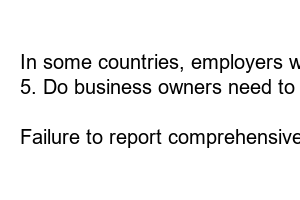종합소득세 대상자
Subject to Comprehensive Income Tax: A Comprehensive Guide to Understanding and Managing Your Taxes
Are you familiar with the term “subject to comprehensive income tax”? If not, don’t worry – in this blog post, we will break down everything you need to know about this important aspect of taxation. Whether you’re an individual taxpayer or a business owner, understanding comprehensive income tax is crucial for effectively managing your finances. So, let’s dive right in!
What is Comprehensive Income Tax?
Comprehensive income tax is a system that requires taxpayers to report and pay taxes on their entire income, including various sources such as wages, salary, rent, dividends, interest, and capital gains. Unlike other forms of income tax, *comprehensive income tax* focuses on the total income a person or business receives in a given year, ensuring that no source of income goes untaxed.
How Does Comprehensive Income Tax Work?
Under comprehensive income tax, taxpayers need to report their income and deductions accurately to calculate their tax liability. *Income* consists of all the money you earn or receive during a tax year, while *deductions* are expenses or financial losses that can lower your taxable income. By subtracting deductions from your income, you arrive at your *taxable income* – the amount on which you will be taxed.
How to Manage Your Taxes Effectively?
To make sure you’re managing your taxes effectively and optimizing your financial situation, consider the following tips:
1. Keep Detailed Records: Maintaining organized records of your income and expenses is crucial for accurate reporting and deductions.
2. Seek Professional Help: Consult a tax professional or accountant who can navigate the complexities of comprehensive income tax and provide guidance tailored to your specific situation.
3. Maximize Deductions: Understand the deductions you qualify for and take advantage of them. This could include deductions for business expenses, home office expenses, education costs, and charitable contributions.
4. Utilize Tax-Advantaged Accounts: Explore options like individual retirement accounts (IRAs) and health savings accounts (HSAs) to minimize your tax liability and build savings for the future.
5. Consider Tax Planning Strategies: Plan your finances strategically to minimize taxes legally. This may involve timing your income and expenses, taking advantage of tax credits, or spreading out capital gains.
6. Stay Informed: Tax laws are subject to change, so it’s essential to stay updated with any relevant tax code amendments that may affect your tax obligations.
Summary
Subject to comprehensive income tax means reporting and paying taxes on your total income from various sources. To effectively manage your taxes, keep detailed records, seek professional assistance, maximize deductions, utilize tax-advantaged accounts, consider tax planning strategies, and stay informed about changes in tax laws. Understanding comprehensive income tax will help you become proactive in managing your finances and ensuring compliance. Remember, a knowledgeable approach can save you money and enable you to make informed financial decisions.
FAQs
1. What is the difference between comprehensive income tax and regular income tax?
Comprehensive income tax includes all sources of income, while regular income tax may only focus on specific types of income, such as wages or self-employment earnings.
2. Are there any exemptions or allowances under comprehensive income tax?
There may be specific exemptions or allowances available, depending on your country’s tax regulations. Consulting a tax professional can help you identify any applicable exemptions or allowances.
3. Do I need to report income from freelance work under comprehensive income tax?
Yes, income from freelance work is considered part of comprehensive income and should be reported accordingly.
4. Can comprehensive income tax be deducted from my paycheck automatically?
In some countries, employers withhold income tax from employees’ paychecks. However, this may not cover all aspects of comprehensive income tax, so it’s essential to review your tax situation independently.
5. Do business owners need to keep separate records for comprehensive income tax?
Yes, it is crucial for business owners to maintain separate records of their income and expenses to accurately calculate their comprehensive income tax liability.
6. What happens if I fail to report comprehensive income?
Failure to report comprehensive income correctly can result in penalties and fines. It’s important to prioritize accurate reporting to avoid any legal and financial consequences.

